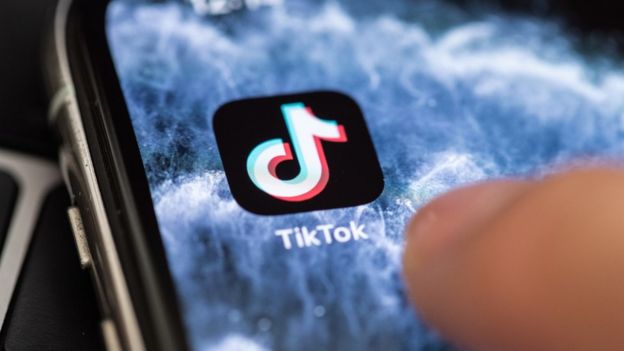
This article is more than
5 year old
A sale was thought close to agreement, but was put in doubt after the US president's warning on Friday.
The Wall Street Journal said Microsoft had now paused talks despite TikTok owner ByteDance making last ditch efforts to win White House support.
It comes amid criticism of Mr Trump's threat as an attack on free speech.
The popularity of the short-form video app has soared, with TikTok thought to have about half a billion active users worldwide - and about 80 million in the US - with a huge proportion of these in their teens or early 20s.
But some US politicians are worried the app's Chinese owner, Bytedance, poses a risk to national security because the app could be used to collect Americans' personal data. Regulators have also raised their own safety concerns.
Late on Friday, Mr Trump told reporters aboard Air Force One: "As far as TikTok is concerned we're banning them from the United States."
And in a statement on Saturday, a White House spokesman said: "The administration has very serious national security concerns over TikTok. We continue to evaluate future policy."
The Wall Street Journal said Bytedance tried to make significant concessions to the White House, including creating of thousands of jobs over three years.
A sale of the US operation to Microsoft, which owns LinkedIn, would give the US tech giant a far greater presence in social media, an area dominated by rivals. The value of TikTok's US arm has been put at between $15bn and $30bn (£11bn-£23bn).
According to the Financial Times, some executives at ByteDance believe Mr Trump's intervention may just be a negotiating ploy to help Microsoft secure a better deal.
TikTok declined to discuss the possible Microsoft deal, but a spokesperson said in a statement on Sunday: "While we do not comment on rumours or speculation, we are confident in the long-term success of TikTok."
The statement re-iterated that the company was committed to protecting the privacy and safety of users.
The move to ban TikTok comes at a time of heightened tensions between the Trump administration and the Chinese government over a number of issues, including trade disputes and Beijing's handling of the coronavirus outbreak.
The president's announcement on Friday was criticised by some in the tech sector, including former Facebook chief security officer Alex Stamos, who questioned whether the move was spurred by national security concerns.
He tweeted: "This is getting bizarre. A 100% sale to an American company would have been considered a radical solution two week ago and, eventually, mitigates any reasonable data protection concerns. If the White House kills this we know this isn't about national security."

Mr Trump was also criticised by the American Civil Liberties Union. "Banning an app that millions of Americans use to communicate with each other is a danger to free expression and is technologically impractical," said the ACLU's surveillance and cybersecurity counsel, Jennifer Granick.
"Shutting one platform down, even if it were legally possible to do so, harms freedom of speech online and does nothing to resolve the broader problem of unjustified government surveillance," she said in a statement.
On Saturday, in a bid to reassure TikTok's millions of US users, Vanessa Pappas, the country's general manager said in a video message: "We're not going anywhere . . . We're here for the long run.
"When it comes to safety and security, we're building the safest app because we know it's the right thing to do. So we appreciate the support."